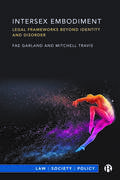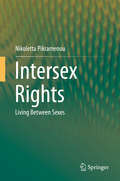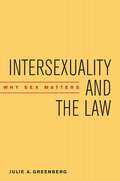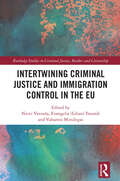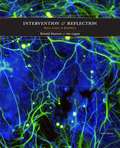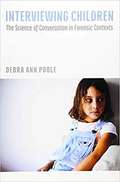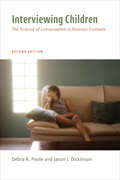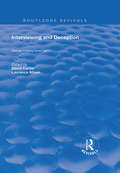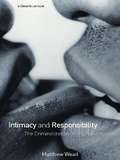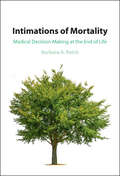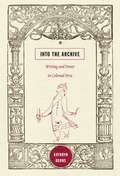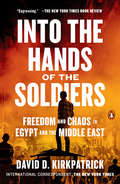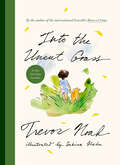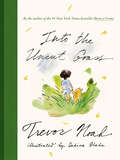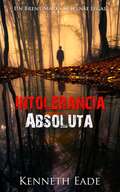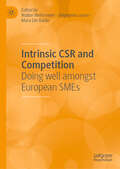- Table View
- List View
Intersex Embodiment: Legal Frameworks beyond Identity and Disorder (Law, Society, Policy)
by Mitchell Travis Fae GarlandThis book examines the divergent medical, political and legal constructions of intersex. The authors use empirical data to explore how intersex people are embodied through these frameworks which in turn influence their lived experiences. Through their analysis, the authors reveal the factors that motivate and influence the way in which policy makers and legislators approach the area of intersex rights. They reflect on the limitations of law as the primary vehicle in challenging healthcare’s framing of intersex as a ‘disorder’ in need of fixing. Finally, they offer a more holistic account of intersex justice which is underpinned by psychosocial support and bodily integrity.
Intersex Rights: Living Between Sexes
by Nikoletta PikramenouThis book addresses intersex rights violations and analyses intersex people’s legal demands as expressed by intersex activists themselves and delivered through statements and reports issued by intersex rights organisations, the United Nations and the Council of Europe. Intersex people are born with sex characteristics that do not fit typical notions of male or female bodies, as a result of which they are stigmatised, marginalised and denied the recognition of their fundamental rights. Often, they are subjected to involuntary and harmful sex “normalising” surgeries at birth, which violate their bodily integrity, self-determination and informed consent, so as to comply with societal and legal norms.Moreover, binary legal frameworks prevent them from enjoying the rights to access identification documents, start a family, or be free from discrimination in all areas including employment and sports. To elaborate on intersex violations that emanate from binary laws, this book examines the situation of intersex rights in regional jurisdictions worldwide and within the European Union in particular. In the process, it identifies current legal barriers and suggests how intersex people could be accommodated under legal frameworks and achieve sex/gender equality beyond binary definitions.
Intersexuality and the Law: Why Sex Matters
by Julie A. GreenbergWinner of the 2013 Bullough Award presented by the Foundation for the Scientific Study of Sexuality The term “intersex” evokes diverse images, typically of people who are both male and female or neither male nor female. Neither vision is accurate. The millions of people with an intersex condition, or DSD (disorder of sex development), are men or women whose sex chromosomes, gonads, or sex anatomy do not fit clearly into the male/female binary norm. Until recently, intersex conditions were shrouded in shame and secrecy: many adults were unaware that they had been born with an intersex condition and those who did know were advised to hide the truth. Current medical protocols and societal treatment of people with an intersex condition are based upon false stereotypes about sex, gender, sexual orientation, gender identity, and disability, which create unique challenges to framing effective legal claims and building a strong cohesive movement. In Intersexuality and the Law, Julie A. Greenberg examines the role that legal institutions can play in protecting the rights of people with an intersex condition. She also explores the relationship between the intersex movement and other social justice movements that have effectively utilized legal strategies to challenge similar discriminatory practices. She discusses the feasibility of forming effective alliances and developing mutually beneficial legal arguments with feminists, LGBT organizations, and disability rights advocates to eradicate the discrimination suffered by these marginalized groups.
Interspecies Ethics
by Cynthia WillettInterspecies Ethics explores animals' vast capacity for agency, justice, solidarity, humor, and communication across species.
Interspecies Ethics
by Cynthia WillettInterspecies Ethics explores animals' vast capacity for agency, justice, solidarity, humor, and communication across species.
Interspecies Ethics
by Cynthia WillettInterspecies Ethics explores animals' vast capacity for agency, justice, solidarity, humor, and communication across species.
Interspecies Ethics (Critical Perspectives on Animals: Theory, Culture, Science, and Law)
by Cynthia WillettInterspecies Ethics explores animals' vast capacity for agency, justice, solidarity, humor, and communication across species. The social bonds diverse animals form provide a remarkable model for communitarian justice and cosmopolitan peace, challenging the human exceptionalism that drives modern moral theory. Situating biosocial ethics firmly within coevolutionary processes, this volume has profound implications for work in social and political thought, contemporary pragmatism, Africana thought, and continental philosophy.Interspecies Ethics develops a communitarian model for multispecies ethics, rebalancing the overemphasis on competition in the original Darwinian paradigm by drawing out and stressing the cooperationist aspects of evolutionary theory through mutual aid. The book's ethical vision offers an alternative to utilitarian, deontological, and virtue ethics, building its argument through rich anecdotes and clear explanations of recent scientific discoveries regarding animals and their agency. Geared toward a general as well as a philosophical audience, the text illuminates a variety of theories and contrasting approaches, tracing the contours of a postmoral ethics.
Intertwining Criminal Justice and Immigration Control in the EU (Routledge Studies in Criminal Justice, Borders and Citizenship)
by Valsamis Mitsilegas Niovi Vavoula Evangelia Lilian TsourdiThis book offers a contemporary understanding of the state of the art of "crimmigration" with a focus on the European Union and challenges this paradigm of intersecting criminal justice and immigration control.The contributions to this book explore the conceptual and philosophical underpinnings of EU and national policies intertwining criminal and migration law, as well as their practical use (and abuse). They analyse migration control through criminal law from multidisciplinary and interdisciplinary perspectives, incorporating insights from law, philosophy, and criminology. The book revisits fundamental questions on the suitability of criminal law to regulate and govern migration and provides insights as to whether and how the law should be amended to limit the negative consequences of the criminalisation of migration. The authors critique the key legal challenges crimmigration poses in terms of legality, fundamental rights, and rule of law adherence. Finally, this volume outlines, through concrete examples, how criminalisation of migration translates into the emergence of hostile environments for migrants and those who assist them.This book will be of interest to criminologists, sociologists, legal scholars, and all those engaged in studies on migration and the European Union.
Intervention and Reflection: Basic Issues in Bioethics
by Ronald MunsonThis 10th Edition offers students a compelling introduction to biomedical ethics by combining riveting human stories with clear explanations of cutting edge scientific research. A collaboration between a nationally-acclaimed bioethicist and a seasoned journalist, this textbook continues to be the most widely used bioethics textbook on the market. Each chapter includes crisp summaries of the relevant ethical theories as well as classic and contemporary articles on the most pressing topics in the field. This edition features new chapters on "Medicine in a Pluralistic Society" and the "Challenge of Global Bioethics. The accessible presentation of the conceptual debate and human dimension of today's biomedical ethics captivates and engages students, whether they are philosophy, nursing or medical majors or have no philosophical or scientific training.
Interviewing Children: The Science of Conversation in Forensic Contexts
by Debra Ann PooleBecause of children’s incomplete language development, their greater risk of retrieving inaccurate information in response to memory cues, and their desire to say what they think the interviewer wants to hear (whether truthful or not), child eyewitness testimony can be unreliable. <p><p> In this book, Debra Ann Poole presents a flexible, evidence-based approach to interviewing children that reduces the ambiguities and errors in children’s responses. <p><p> Through her descriptions of best practices, brief summaries of supporting research, and example interview dialogs, Poole provides a roadmap for anyone working in a forensic context. <p><p> This book is essential reading for those who interview children, supervise interviewers, review interview findings, or craft local policies about interviewing children.
Interviewing Children: The Science of Conversation in Forensic Contexts
by Dr. Debra Ann Poole PhD Dr. Jason J. DickinsonInterviewing Children is an accessible guide for forensic interviewers, clinicians, attorneys, and other professionals who rely on children&’s testimony. In this second edition, Poole and Dickinson present new thematic chapters on conversation habits, conventional content, and protocols for training.Highlights include: Sample dialogues that help flesh out and illustrate research-based recommendations for practice quick guides that synthesize core ideas and skills "Principles to Practice" sections that answer questions about child interviewing; and a comprehensive appendix of learning activities readers can use to sharpen their interviewing skills. The primary goal of all conversations with child witnesses is to help children describe events in their lives as completely, accurately, and unambiguously as they can. But common obstacles can make this task difficult, if not impossible. Interviewing Children offers a comprehensive look at the science of conversation with children in forensic contexts and provides the research-based tools and practices for navigating these obstacles.
Interviewing For The Helping Professions: A Comprehensive Relational Approach
by Nicole Nicotera Fred McKenzieA successful professional interview depends on the development of a generally positive human interaction. Without a positive base, the interview can be fraught with difficulties and roadblocks. This is true regardless of the discipline, be it social work, psychology, human services, nursing, criminal justice, medicine, psychiatry, or any other field. Beginning interviewers may have learned solid technique, but often are initially focused more on thinking about what they will say next than on understanding or even listening to the client. As a result, that critical initial interview -- whose success affects the future of most professional encounters -- is often disrupted by a failure to truly listen and understand, which is the foundation for earning clients' trust. This second edition goes beyond most other clinical interviewing books in its emphasis on the emotional foundation of interviewing and its focus on the importance of social justice and attention to the problem of microaggressions that can prohibit building and maintaining therapeutic rapport with clients. Interviewing for the Helping Professions can help both the beginning professional and the veteran interviewer understand the nature and purpose, technique, meaning, emotions, and outcomes of the interviewing process. The book also provides a comprehensive overview of the theory and technique so crucial to meaningful interviewing. More important, it emphasizes the emotional significance of the interaction and grounds the interviewing process in contemporary theories of practice and social justice.
Interviewing and Deception (Routledge Revivals)
by David Canter Laurence AlisonFirst published in 1999, this volume brings together a unique range of previously unpublished studies that explore the psychological processes involved in interviewing, statement validation, detecting deception and the use of expert witnesses for the examination of such processes. One major challenge of any police enquiry is to filter out the distortions in the collection, collation and employment of the information on which all subsequent actions rely. These distortions may be produced by poor witness recall, deliberate obfuscation and deception, professional negligence or as a product of a variety of communication problems. The contributors to the volume tackle these and many related issues. Recent developments in our understanding of the investigative interview process are covered in a number of insightful studies by leading researchers, combining academic rigour with direct practical relevance. The wide range of topics covered in this volume will be of value and interest to all students of crime and its investigation as well as those who have a broader interest in interviewing and the assessment of information from naturally occurring accounts. Social scientists and those psychologists concerned to develop their understanding of accounts of crime will find the volume of particular utility, as will all those in law enforcement who wish to see an improvement in these crucial aspects of all criminal investigations.
Interviewing and Investigating: Essential Skills for the Paralegal
by Stephen P. ParsonsA comprehensive and practical approach that builds a strong foundation for understanding paralegal interviewing and investigation skills.
Intimacy and Responsibility: The Criminalisation of HIV Transmission
by Matthew WeaitIn what circumstances and on what basis, should those who transmit serious diseases to their sexual partners be criminalised? In this new book Matthew Weait uses English case law as the basis of a more general and critical analysis of the response of the criminal courts to those who have been convicted of transmitting HIV during sex. Examining cases and engaging with the socio-cultural dimensions of HIV/AIDS and sexuality, he provides readers with an important insight into the way in which the criminal courts construct the concepts of harm, risk, causation, blame and responsibility. Taking into account the socio-cultural issues surrounding HIV/AIDS and their interaction with the law, Weait has written an excellent book for postgraduate and undergraduate law and criminology students studying criminal law theory, the trial process, offences against the person, and the politics of criminalisation. The book will also be of interest to health professionals working in the field of HIV/AIDS genito-urinary medicine who want to understand the issues that may face their clients and patients.
Intimate Partner Violence: Effective Procedure, Response and Policy
by Kit Gruelle Elicka SparksWritten by experts with a combined 50 years of experience teaching and researching in the field of domestic abuse, Intimate Partner Violence: Effective Procedure, Response, and Policy provides practical instruction for practitioners and lay people responding to domestic violence, as well as ideas for policymakers working to create solutions to the violence. Narratives by victims of intimate partner abuse provide a framework from which students and practitioners can assess address problems of domestic abuse. This book focuses on what can be practically done to address the problem of domestic violence for individual practitioners as well as policymakers, lawmakers, and criminal justice practitioners.
Intimate Violence Across the Lifespan
by Tova Band-Winterstein Zvi EisikovitsEvidence pertaining to continual violence throughout the life cycle coupled with the experience of growing old in a life permeated by intimate violence is scarce. And the focus is usually on the victims usually, the older, battered women and seldom on their aging partners or adult children who were part and parcel of the violent dynamics in the family system. With the increase in longevity and the older population's subsequent growth in size, the number of elderly couples living and aging in long-lasting conflictive relationships is on the rise. The relatively intense preoccupation with elder abuse in the gerontological literature in recent years has not specifically addressed long-term intimate violence among the old adults and its lasting consequences. Similarly, the literature on intimate intergenerational relationships in old age has usually focused on normative exchanges between partners and their extended family, including their adult children. Therefore, conflictive relationships, and particularly violent ones, have also fallen outside the scope of this body of research. This volume describes and analyzes the various perspectives of family members concerning life, and particularly old age, in the shadow of long-term intimate violence. It explores how people make sense out of living and aging in violence, how interpersonal, familial and cross-generational relationships are perceived and reconstructed and how "we-ness" is achieved, if at all, in such families.
Intimations of Global Law
by Neil WalkerA strain of law reaching beyond any bounded international or transnational remit to assert a global jurisdiction has recently acquired a new prominence. Intimations of Global Law detects this strain in structures of international law claiming a planetary scope independent of state consent, in new threads of global constitutional law, administrative law and human rights, and in revived notions of ius gentium and the global rule of law. It is also visible in the legal pursuit of functionally differentiated global public goods, general conflict rules, norms of 'legal pluralism' and new legal hybrids such as the global law of peace and humanity law. The coming of global law affects how law manifests itself in a global age and alters the shape of our legal-ethical horizons. Global law presents a diverse, unsettled and sometimes conflicted legal category, and one which challenges our very understanding of the rudiments of legal authority.
Intimations of Mortality: Medical Decision-Making at the End of Life
by Barbara A. ReichIn Intimations of Mortality, Barbara Reich offers an empirically-based critique of the failures of end-of-life communication and decision-making in the United States. Using England and Canada as occasional foils, Reich explores why U.S. physicians, patients, and families struggle to have the conversations necessary to provide seriously ill and dying patients with medical care consistent with their preferences. Reich also shows how a number of different factors –including payment mechanisms, liability fears, cultural phenomena, communication avoidance, death denial, and clinical uncertainty –impact physician-patient communication and medical decision-making, leave patients and families without the tools they need to make informed choices, and instead leave the default practices in place. Ultimately, this groundbreaking analysis unveils the interconnectedness of the many obstacles to better communication and decision-making in end-of-life communications and offers much-needed suggestions for improvement.
Into the Archive: Writing and Power in Colonial Peru
by Kathryn BurnsWriting has long been linked to power. For early modern people on both sides of the Atlantic, writing was also the province of notaries, men trained to cast other people's words in official forms and make them legally true. Thus the first thing Columbus did on American shores in October 1492 was have a notary record his claim of territorial possession. It was the written, notarial word--backed by all the power of Castilian enforcement--that first constituted Spanish American empire. Even so, the Spaniards who invaded America in 1492 were not fond of their notaries, who had a dismal reputation for falsehood and greed. Yet Spaniards could not do without these men. Contemporary scholars also rely on the vast paper trail left by notaries to make sense of the Latin American past. How then to approach the question of notarial truth? Kathryn Burns argues that the archive itself must be historicized. Using the case of colonial Cuzco, she examines the practices that shaped document-making. Notaries were businessmen, selling clients a product that conformed to local "custom" as well as Spanish templates. Clients, for their part, were knowledgeable consumers, with strategies of their own for getting what they wanted. In this inside story of the early modern archive, Burns offers a wealth of possibilities for seeing sources in fresh perspective.
Into the Hands of the Soldiers: Freedom and Chaos in Egypt and the Middle East
by David D. KirkpatrickA candid narrative of how and why the Arab Spring sparked, then failed, and the truth about America's role in that failure and the subsequent military coup that put Sisi in power--from the Middle East correspondent of the New York Times.In 2011, Egyptians of all sects, ages, and social classes shook off millennia of autocracy, then elected a Muslim Brother as president. The 2013 military coup replaced him with a new strongman, Abdel Fattah el-Sisi, who has cracked down on any dissent or opposition with a degree of ferocity Mubarak never dared. New York Times correspondent David D. Kirkpatrick arrived in Egypt with his family less than six months before the uprising first broke out in 2011, looking for a change from life in Washington, D.C. As revolution and violence engulfed the country, he received an unexpected and immersive education in the Arab world.For centuries, Egypt has set in motion every major trend in politics and culture across the Middle East, from independence and Arab nationalism to Islamic modernism, political Islam, and the jihadist thought that led to Al Qaeda and ISIS. The Arab Spring revolts of 2011 spread from Cairo, and now Americans understandably look with cynical exasperation at the disastrous Egyptian experiment with democracy. They fail to understand the dynamic of the uprising, the hidden story of its failure, and Washington's part in that tragedy. In this candid narrative, Kirkpatrick lives through Cairo's hopeful days and crushing disappointments alongside the diverse population of his new city: the liberal yuppies who first gathered in Tahrir Square; the persecuted Coptic Christians standing guard around Muslims at prayer during the protests; and the women of a grassroots feminism movement that tried to seize its moment. Juxtaposing his on-the-ground experience in Cairo with new reporting on the conflicts within the Obama administration, Kirkpatrick traces how authoritarianism was allowed to reclaim Egypt after thirty months of turmoil.Into the Hands of the Soldiers is a heartbreaking story with a simple message: The failings of decades of autocracy are the reason for the chaos we see today across the Arab world. Because autocracy is the problem, more autocracy is unlikely to provide a durable solution. Egypt, home to one in four Arabs, is always a bellwether. Understanding its recent history is essential to understanding everything taking place across the region today--from the terrorist attacks in the North Sinai and Egypt's new partnership with Israel to the bedlam in Syria and Libya.
Into the Uncut Grass
by Trevor NoahFrom the #1 New York Times bestselling author of Born a Crime comes a timeless illustrated story inviting people of all ages to connect with one another in a world brought to life with imagination. &“But sooner or later your mother will find us,&” Walter said, looking back at the house. &“She always does.&”The boy&’s eyes lit up again. He had an idea.&“Then this time we need to go where we&’ve never gone before,&” he said. &“Into the uncut grass!&” In the tradition of The Boy, the Mole, the Fox and the Horse comes a gorgeously illustrated fable about a young child&’s journey into the world beyond the shadow of home, a magical landscape where he discovers the secrets of sharing, connection, and finding peace with the people we love. Infused with the author&’s signature wit and imagination, in collaboration with visionary artist Sabina Hahn, it&’s a tale for readers of all ages—to be read aloud or read alone.
Into the Uncut Grass
by Trevor NoahA story for all ages from the author of the #1 bestselling Born a Crime &“What will we find in the uncut grass?&”&“It depends on what we&’re looking for.&”In the tradition of The Boy, the Mole, the Fox and the Horse comes a gorgeously illustrated fable about a young child&’s journey into the world beyond the shadow of home, a magical landscape where he discovers the secrets of solidarity, connection, and finding peace with the people we love. Infused with the author&’s signature wit and imagination, in collaboration with masterful artist Sabina Hahn, it&’s a tale for readers of all ages—to be read aloud or read alone.
Intolerancia absoluta
by Kenneth Eade Alejandra GutiérrezLa homofobia se vuelve mortal cuando un asesino en serie ataca en esta excelente nueva novela de suspenso legal. El abogado Brent Marks aboga por un caso de matrimonio de una pareja gay. Luego de obtener la victoria, la pareja es encontrada brutalmente asesinada pasando a convertirse en las primeras víctimas de un infame asesino en serie, cuyos blancos son parejas homosexuales. Toda la evidencia apunta a un fanático religioso que ha hablado abiertamente en contra del matrimonio gay y que le pide a Brent que lo defienda. ¿Podrá Brent resolverse a defender al único sospechoso del caso a quien la policía considera responsable? En un terreno donde la ética y la tolerancia chocan, Brent deberá resolver los asesinatos para armar una defensa viable, lo que lo llevará a él y a su equipo directamente a la senda del asesino. Elogios de la crítica “Kenneth Eade es uno de nuestros escritores de thrillers más sólidos y el hecho de que extrae sus historias del panorama filosófico contemporáneo es un gran mérito suyo”. Grady Harp, Amazon Hall of Fame, Top 100 y Vine Voice. “Intolerancia absoluta está llena de emocionantes giros inesperados, pero su verdadera sorpresa reside en la inesperada conclusión que resume con esmero los eventos sin tomar un camino predecible. Esto la convierte en una joya para los lectores de misterios y dramas legales acostumbrados a pistas que llevan a una sola dirección. Sin dar más detalles, baste decir que Intolerancia absoluta da que pensar de principio a fin y es una historia irresistible impulsada por asuntos sobre la religión y las libertades civiles de los gais”. Midwest Book Review.
Intrinsic CSR and Competition: Doing well amongst European SMEs
by Mara Del Baldo Walter Wehrmeyer Stéphanie LooserThis edited book is at the intersection of the discussion on family-owned business, the CSR agenda and company competition in Europe. The authors contribute to the debates on corporate social responsibility by arguing that formal management systems are not the one-size-fits-all solution they are typically presented to be. Exploring alternative interpretations of the profile environmental management activities have in SMEs, the book evaluates the way in which cultural and ethical values are embedded in European SMEs in order to drive and orientate CSR successfully without following the mainstream ‘systems’ approach. It addresses several values of thought within the CSR debate such as intrinsic CSR, the role of virtue ethics and moral theory in corporate culture, environmental sustainability and vision-driven CSR. Focusing on a European perspective, the book heuristically explores an alternative model for the integration of CSR, innovation dynamics and economic success driven by intrinsic values rather than extrinsic post-decision rationalisations.
